Who really keeps NASA’s Operation IceBridge Flying? These guys:
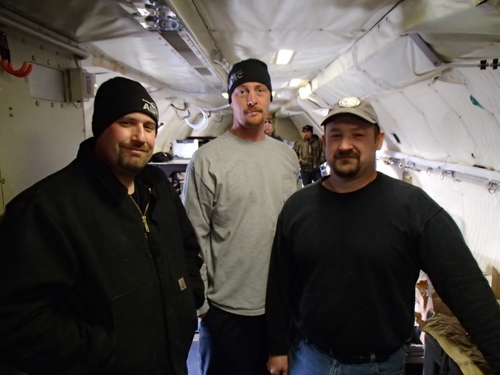
Let me introduce you to Brian Yates, Mike Terrell, and John Doyle. The pilots and these three make up the Flight Crew. Not only do these guys operate the plane and all the systems on the plane in flight, they do all the maintenance of the plane.
Brian Yates is from Lebanon, VA which is about as far west as you can go in Virginia. He went to Lebanon HS where he played second base and worked on his family’s small farm growing up. Brian joined the Navy out of high school and was first trained as an engine mechanic and then a flight engineer on P-3’s. He left the Navy after six years and held jobs in the railroad industry and worked for NASA for a time. Brian went back to school and earned his RN degree. He worked as a trauma nurse but found he missed aviation and returned to NASA as flight engineer aboard the P-3. Brian is married with two young kids and says the time away from family is ‘not fun.’
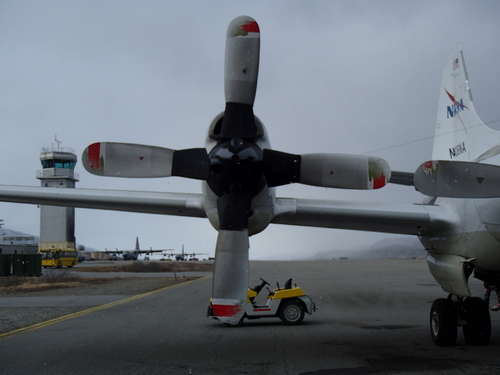
Mike Terrell is from Sanford, NC, 25 miles south of Chapel Hill. He graduated from Lee County HS where he played football, basketball, and baseball and was into computers. He entered the Navy at age 17 and served 11 years. He now splits his career between the U.S. Customs; they fly 19 P-3’s, and NASA’s Operation IceBridge. Mike has three older kids: a son who is serving in Afghanistan as combat medic, a daughter in Indianapolis, and a son in Jacksonville, FL. Mike became a grandfather on this deployment and proudly showed off pictures of his grandchild that day. He says that technology and an international calling plan make being gone easier that it used to be, but he was looking forward to getting back to Jacksonville and Indy as soon as he is finished with this deployment.
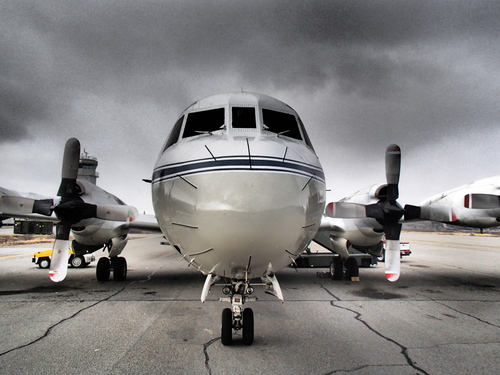
John Doyle is from Salisbury, MD and graduated from Bennett HS. While talking with John, he and Matt Linkswiler from the ATM team realized they graduated the same high school … 20 years apart. He played football and baseball and wrestled. John joined the Marine Corps out of high school and was an engine mechanic on C-130’s. He’s been at NASA’s Wallops Flight Facility for 15 years. He has a 3-year-old and a 5-year-old and simply said his family ‘hates it’ when he’s gone.
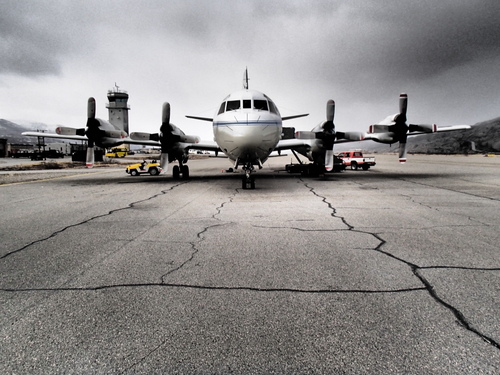
One IceBridge member specifically credits John and Brian with saving their lives one night while transiting the Drake PassageStrait, connecting the Atlantic and Pacific oceans between Tierra del Fuego and the South Shetland Islands. Located about 100 mi (160 km) north of the Antarctic Peninsula, it is 600 mi (1,000 km) wide. in winter. Two engines were losing power and the plane was losing altitude, but John had the pilots drop even lower to get to warmer air – a risky maneuver. Sure enough the engines regained power and they made it home. When I asked John about this story, he shrugged, and simply said, ‘Brian and I did some problem solving, that’s all.’ With pros like Brian, Mike, and John aboard I felt pretty good about flying in remote places.
I asked Mike Terrell if he had any advice for the students I teach and he said, ‘Find something you like doing and perfect your craft. Learn early and stick with it.’ All three said the part they liked about flying with IceBridge was that not only do they work on the plane on the ground, but they fly on the plane during the missions. That is rarely the case in aviation. They also liked the challenge of doing their work in places where they might not have access to all the modern conveniences back in the states, citing a time they used a luggage conveyor to help change some engine parts. These three are the first ones on the plane in the morning and the last to leave at night often doing maintenance well into the night. These are hard-working guys who got me back to my family safely – I’m forever grateful.
John Doyle makes sure a C-130 can squeeze between the P-3 and a vintage DC-3.
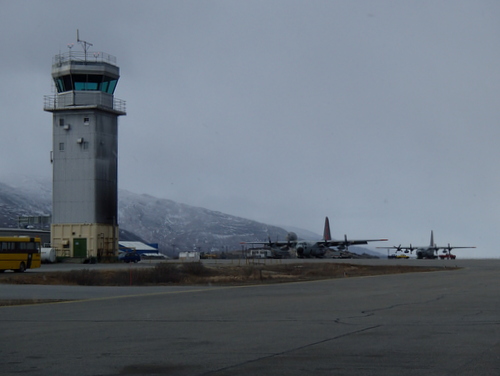


Comments